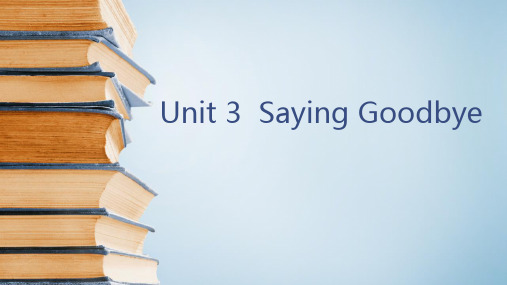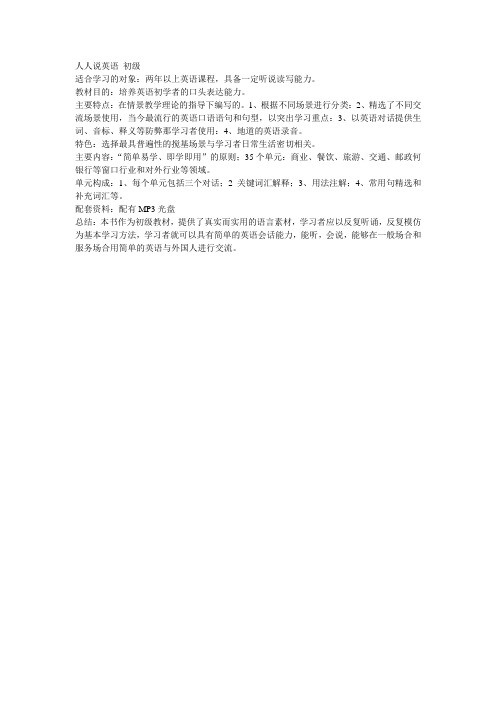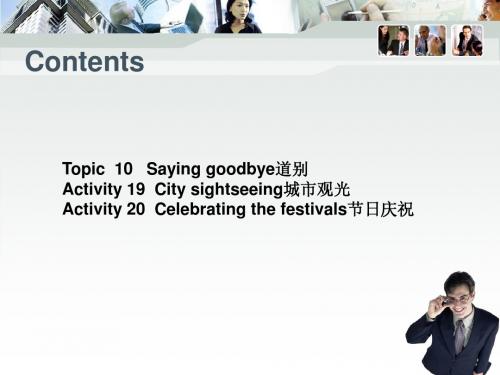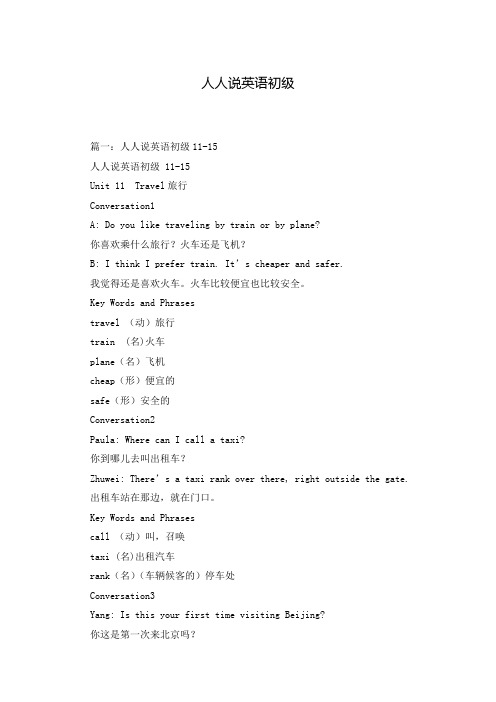人人说英语初级课件Unit 3 Saying Goodbye
人人说英语初级课件Unit 3 Saying Goodbye

很高兴和你(进行了)交谈。 给我打电话或发电子邮件。
回头见。
Bye for now.
See you next week. Catch you later.
那就再见吧。
下周见。
一会儿见。
Have a good time!
Have a nice weekend. Have a nice trip/a good journey! Take care! Good luck!
情态动词:有词义,不能单独作谓语,必须和其他词一起构成谓 语,另外重要的一点是情态动词没有人称和数的变化;情态动词 后必须跟动词原形 肯定句:主语+may/can/must+动词原形 否定句:主语+ may/can/must+not+动词原形 疑问句: may/can/must+主语+动词原形 e.g. 1 你可以吃饭,但你必须洗手。 2他很会跑,但是我不会。 3我可以借你的钢笔用一用吗?
Conversation3 Kevin: Song, I hate to say goodbye, but I have to. 小宋,我很想再呆会,不过我还是 得告辞了。 Song: Nice meeting you, Kevin. I hope to see you again.认识你我很高兴,凯文。希 望能再见。
好好玩儿。
周末愉快。
旅途愉快!
保重!
祝你好运!
Байду номын сангаас
Vocabulary
have(动词)有,持有
in(介词)在内,在。。。里 a(冠词)一 good(形容词)好的,好 next(形容词)下一个,其次
time(名词)时间,时候
now(副词)现在,此刻,马上
in :表示场所和时间的介词 表示地点的介词:in,an 1.in:在某地(表示比较宽敞的场所) In Beijing 在北京; in China 在中国; in the world 在世界上 2.At:在某地点(表示比较狭窄的场所) at school 上学 ;at home 在家 e.g. I will meet him at the Beijing railway station
人人说英语介绍

人人说英语初级适合学习的对象:两年以上英语课程,具备一定听说读写能力。
教材目的:培养英语初学者的口头表达能力。
主要特点:在情景教学理论的指导下编写的。
1、根据不同场景进行分类:2、精选了不同交流场景使用,当今最流行的英语口语语句和句型,以突出学习重点:3、以英语对话提供生词、音标、释义等防弊那学习者使用:4、地道的英语录音。
特色:选择最具普遍性的搅基场景与学习者日常生活密切相关。
主要内容:“简单易学、即学即用”的原则;35个单元:商业、餐饮、旅游、交通、邮政何银行等窗口行业和对外行业等领域。
单元构成:1、每个单元包括三个对话;2关键词汇解释;3、用法注解;4、常用句精选和补充词汇等。
配套资料:配有MP3光盘总结:本书作为初级教材,提供了真实而实用的语言素材,学习者应以反复听诵,反复模仿为基本学习方法,学习者就可以具有简单的英语会话能力,能听,会说,能够在一般场合和服务场合用简单的英语与外国人进行交流。
〈人人说英语〉初级课程本课程选用多位知名专家共同倾力打造的最新实用口语教材《人人说英语》(初级)。
教材以“经典场景,经典对话”为主线,内容涉及商业、餐饮、旅游、交通、邮政和银行等诸多窗口行业和对外服务行业领域,涵盖了日常生活的方方面面。
语言地道、实用、紧扣时代气息、读起来琅琅上口、易学易用。
教师依托教材经典内容,进行丰富拓展,让学员可以既知其表又知其理,活学活用,从本质上大幅提高口语交流水平。
1.适用人群:◆单词量500之上, 有过两年以上英语学习经历, 但基础较薄弱, 迫切需要提高基础口语对话能力的在校学生, 各行各业在职职工, 和具有同等水平的广大市民.◆需要为出国学习或移民打下坚实口语基础的人员.2.初级课程教学目标:通过学习《人人说英语》初级课程,学员可以具有扎实的基础英语会话能力,能听、会说、能够在各窗口行业和涉外岗位的一般交际场合和服务场合用简单而准确的英语与外国人交流。
并为以后的高级口语学习打下坚实基础。
saying good bye WPS演示 演示文稿

Saying Goodbye /baike/yingyuyinbiao.htmF:\fanfang\我的教学\2012年下教学\经典金曲回放..flvwords and phrase⏹ahead 英[ə'hed] 美[ə'hɛd]⏹adj. 向前;在前的;领先⏹adv. 向前的;领先的You have to work hard to keep ahead in your class.要想在全班保持成绩领先,你就必需努力学习⏹concert 英['kɒnsət] 美['kɑnsɚt]⏹n. 音乐会;一致;和谐⏹vt. 使协调;协同安排⏹vi. 协调;协力⏹adj. 音乐会用的;在音乐会上演⏹convenient 英[kən'viːnɪənt] 美[kən'vinɪənt]⏹adj. 方便的⏹[ 比较级more convenient 最高级most convenient ]⏹I live just by the market, and it's very convenient to go shopping.⏹我家就住在商场旁边,买东西很方便。
⏹particular 报错英[pə'tɪkjʊlə] 美[pɚ'tɪkjəlɚ]⏹adj. 特别的;详细的;独有的;挑剔的⏹n. 详细说明;个别项目in particular 尤其,特别⏹particular case 特例;特定情况⏹particular about 过分讲究的;难以取悦的⏹particular average 单独海损(海上保险)⏹particular solution [计]特解⏹in every particular 在一切方面;每一项;每一点⏹free from particular average [法]单独海损不赔⏹marvelous 报错美['mɑrvələs]⏹adj. 了不起的;非凡的;令人惊异的;不平常的⏹[ 比较级more marvelous 最高级most marvelous Welcome to the marvelous world of data mapping, where every rule has an exception.⏹欢迎来到奇妙的数据映射世界,这里的每条规则都有例外。
小学英语-情景交际 课件 ppt--告别

习题:选一选。 1. 表示对某人得想念,怎么表达:__________ A. See you. B. You're welcome C. I will miss you.
A.will
B.can
C.am
习题:选一选。
1. Best wishes ______ you.
A. to
B. of
C. on
2. I ______ be six years old next year.
A.will
B.can
C.am
PART 03
综合练习 Practice
3
一、连线。
Goodbye. What's your name. See you soon. I'll miss you. How 5
总结 Summary
4
课后总结
1. 词汇:best wishes, when, before, leave, go home, that, this, forgot, tomorrow, lovely, talk, share, eat, laugh, again, miss
2.句型:
②主语+be going to+动词原形+其他 例句:I am going to fly a kite next weekend.
I will clean my room tomorrow.
习题:选一选。
1. Best wishes ______ you.
saying goodbye

Contents
Activity 20 Celebrating the festivals 1 Learning to listen 1. Listen and put the right numbers under the pictures. 2. Listen and choose. 1) Valentine died on December 24th /February 14th. 2) A priest /doctor named Valentine did not obey the rules. 3) On New Year’s Eve a family /a classmates reunion dinner will be held. 4) Valentine’s Day is a day celebrated by young couples /people of all ages. 5) The king of Spain /Rome forbade people to marry.
(
2)
(
4
)
(
1
)
(
3)
Contents
2 Learning to talk Scene 1 Talking about the Spring Festival Lester: Helen, I hear that you have just had the Spring Festival? Helen: Yes. It is the most important traditional festival for the Chinese. L: I’m very interested in Chinese culture. Could you tell me how you spend the holiday? H: Sure. Before the festival, every family will do the cleaning. House cleaning is believed to drive away bad fortune and bring good luck in the coming year. And windows and doors are decorated with red paper-cuts and couplets. L: I have seen some paper-cuts. Really beautiful! H: On New Year’s Eve a family reunion dinner is always held. L: What do people usually have for the dinner?
unit-1-Never-say-goodbye-ppt讲解学习

Part One: (Paragraphs 1-4)
• Main idea: • Bringing up the problem the author was
confronted with: it is hard to overcome the sadness as the moment of parting drew near. So he turned to his grandpa for help.
• comprehend the topic sentences in Text 1 thoroughly and be able to paraphrase them.
• get a list of new words and structures and use them freely in conversation and writing.
• Part I (para1-4) The problem the author was confronted with.
• Part II (para5-13) Grandpa illustrates the meaning of “never say goodbye”.
• Part III (para14-20) The author’s understanding of “never say goodbye”.
Farewell 告别,永别,告别演唱会和送别会
• Farewell:old-fashioned the action of saying goodbye;farewell party /dinner /drink etc a party or dinner that you have because someone is leaving a job, city
三年级上册英语课件-Unit 3 你还好吗?

Today I won a Chess game. Now I feel _h_a_p_p_y_.
It’s raining and I can’t go out to play. I feel _b_o_r_e_d_.
Are you ok = Are you alright
Yesterday, I lost my bag. I can’t find it. I feel _s_a_d___.
C
I listen and hear with my ears.
I touch and feel with my hands.
D
E
Are you ok ? sick
My head hurts.
我们学过的一般疑问句有三种类型: 1.以系动词be开头(am、is、are) 例: Am I OK?
I can smell some nice noodle soup. I feel _h_u_n_g_ry_.
Practice
用hungry、sad、happy、tired、bored完成下列句子。 1.I ran 100 meters for Sports Day. I’m the winner. I feel _h_a_p_p_y_ now. 2.I work on the farm all day. Now I feel __ti_re_d__. 3.I lost my book. I feel __sa_d___. 4.I don’t want to do anything. I feel _b_o_re_d__. 5.It’s twelve o’clock. It’s time to have lunch. I feel _h_u_n_g_ry_.
英语见面和再见问候语全面总结Sayinghelloandgoodbye专题培训课件

Used after someone is introduced to you
1. Good to meet you. 2.It’s nice to meet you. 3. I’m pleased / glad to meet you. 4. It’s a pleasure to meet you. 5. It’s quite an honor to meet you.
Used when meet someone after a long time
1. oh my god, it’s you! 2. Aahh, where have you been? 3 My goodness, long time no speak / see. 4. Wow, it’s so good to see you again. 5. Hey, buddy. It’s been a while (since
1. Hello, did you understand what I said?
2. Hello, was that too difficult for you to read?
3. Hello, did you see me waving at you? 4. Hello, do you not recognize me? 5. Hello, what time do you call this? You
are late.
Parting is such sweet sorrow that I shall say goodnight, till it be morrow.
By Wilห้องสมุดไป่ตู้iam Shakespeare
综合英语教程Unit1-Never-Say-Goodbyeppt课件

❖Where: in the author’s big old house ❖Who: the author, his grandfather ❖What: The author was to leave his big old house. His
grandfather told him “never say goodbye”.
❖How are the events of the essay arranged?
❖They are related in a chronological order with a flashback in the middle part, p10-12
Part2
Para.5-Para.13 The author’s grandpa informed him of the essence of “never say goodbye” through the story of his eldest son---Billy.
Part3
Para.14-Para.20 The author truly understood the meaning of “never say goodbye” and responded to his grandpa's death calmly.
Unit 1
Never Say Goodbye
Department of Foreign Languages of HBPU
Contents
1
Pre-reading question
2
Global reading
人人说英语初级

人人说英语初级篇一:人人说英语初级11-15人人说英语初级 11-15Unit 11 Travel旅行Conversation1A: Do you like traveling by train or by plane?你喜欢乘什么旅行?火车还是飞机?B: I think I prefer train. It’s cheaper and safer.我觉得还是喜欢火车。
火车比较便宜也比较安全。
Key Words and Phrasestravel (动)旅行train (名)火车plane(名)飞机cheap(形)便宜的safe(形)安全的Conversation2Paula: Where can I call a taxi?你到哪儿去叫出租车?Zhuwei: There’s a taxi rank over there, right outside the gate.出租车站在那边,就在门口。
Key Words and Phrasescall (动)叫,召唤taxi (名)出租汽车rank(名)(车辆候客的)停车处Conversation3Yang: Is this your first time visiting Beijing?你这是第一次来北京吗?Paula: Yes. Is it easy to get around?是啊。
市内交通方便吗?Yang: I think so. You can get anywhere by bus and taxi is not very expensive.我认为方便。
坐公共汽车哪儿都能到,出租车也不贵。
Paula: How about the subway?地铁怎么样?Yang: It’s also convenient, but it’s usually crowded.地铁也方便,就是挤一些。
Key Words and Phrasesget around走动,(乘交通工具)旅行anywhere (副)任何地方subway(名)地铁expensive(形)贵的,花钱多的crowded(形)拥挤的Additional Useful ExpressionsWhat’s the best way to get around?怎样在城里游览最方便?Does this bus go to the Summer Palace?这辆车去颐和园吗?How often does the bus run?隔多长时间发一辆车?Would you tell me where to get off?请告诉我在哪下车?Will you remind me when we get there?到地方你叫我一下Where can I hire a car? 我到哪儿可以租到车。
- 1、下载文档前请自行甄别文档内容的完整性,平台不提供额外的编辑、内容补充、找答案等附加服务。
- 2、"仅部分预览"的文档,不可在线预览部分如存在完整性等问题,可反馈申请退款(可完整预览的文档不适用该条件!)。
- 3、如文档侵犯您的权益,请联系客服反馈,我们会尽快为您处理(人工客服工作时间:9:00-18:30)。
Song: Sure, let’s. Goodbye, then.
咱们保持联系吧。
好的,一定。再见吧。
Kevin: Bye.
再见。
Key Words and Phrases hate(动词)不愿,不喜欢 hate to do hate doing 讨厌做某事{一次} 持续讨厌
再见的几种表示:
• Goodbye、bye • See u later
• See you/see ya
• Ta-ta
Keywords and phrases
• Later(副词)稍后,随后 go (动词)走,离去
• Notes :
• Well 用来引导一句话,继续讲述或填补讲话中的间歇。
• I’ve got to 我得。是口语表达形容词式。(have to)
表示时间的介词:at,On,in At 用于表示时刻,时间的某一点 at noon 正午时 at present 目前 At nine(o’clock)在九点钟 e.g. We usually have lunch at noon On:用于某一天的上午或者下午(具体的某一天时一律用on) On Monday On June 6 On a cold night On Tuesday morning In:用于表示周,月,季节,年 泛指上午,中午,晚上 In the week In May In 1995 In the afternoon
Let’s是Let us(让我们)在口语中的缩写形容词式。用于提建 议、倡导做某事。
Additional Useful Expressions Nice meeting you. Nice talking to you. Call me or e-mail me. See you around/soon.
很高兴认识你。
很高兴和你(进行了)交谈。 给我打电话或发电子邮件。
回头见。
Bye for now.
See you next week. Catch you later.
那就再见吧。
下周见。
一会儿见。
Have a good time!
Have a nice weekend. Have a nice trip/a good journey! Take care! Good luck!
好好玩儿。
周末愉快。
旅途愉快!
保重!
祝你好运!
Vocabulary
have(动词)有,持有
in(介词)在内,在。。。里 a(冠词)一 good(形容词)好的,好 next(形容词)下一个,其次
time(名词)时间,时候
now(副词)现在,此刻,马上
in :表示场所和时间的介词 表示地点的介词:in,an 1.in:在某地(表示比较宽敞的场所) In Beijing 在北京; in China 在中国; in the world 在世界上 2.At:在某地点(表示比较狭窄的场所) at school 上学 ;at home 在家 e.g. I will meet him at the Beijing railway station
• See you是常用非正式道别用语。
• Have a nice day是道别时的常用语。
Conversation 2 Paul: I’ve got to go to bed. Have to work tomorrow.
班。 我得去睡觉了。明天还得上
Zheng: OK. Good night, then. Have a good sleep.
Conversation3 Kevin: Song, I hate to say goodbye, but I have to. 小宋,我很想再呆会,不过我还是 得告辞了。 Song: Nice meeting you, Kevin. I hope to see you again.认识你我很高兴,凯文。希 望能再见。
keep in touch=get in touch (with) 保持联系 hope (动词)希望,盼望,期待 sure (副词)当然,的确 Goodbye是正式告别用语 Bye是Goodbye的简化形容词式 Say goodbye是道别,说再见的意思。
Nice meeting you是惯用语。用于告别时。
Unit 3 Saying Goodbye
• Conversation1 • A: Well, I’ve got to go. See you later. 呆会见。 • B: See you .Have a nice day! 愉快! • A: Thanks, you too. 唔,我得走了。 再见。祝你过的 谢谢,也祝你愉快。
3 I slept badly yesterday night 我昨晚睡得不太好
work (动词)工作/干活儿
tomorrow(名词)明天
Notes :
I’ve got to 是I have to的口语形容词式 。
have to 是习惯用语。意思同must是必须,不得不的意思。 Good night是道别用语。用于晚上分别前,特别是睡觉前。
觉。
那好吧。晚安。睡个好
Paul: Good night. See you tomorrow.
见。
晚安。明天
Key Words and Phrases
go to bed(固定词组,瞬间动作)去睡觉/睡觉去 (不能+the哦)
sleep(动词)睡觉 ,睡着(持续的动作) e.g.1.I will go to bed early tonight 我今天要早点睡觉 2.She is still sleeping 她还在睡觉
练习:
1.上周五下午我们没去听演讲 We didn’t listen to the lecture ____(on/in) Friday night 2.人们喜欢冬天去滑冰 People go skating __(on/in)Winter 3.明天九点钟我有一个会议 I will have a meeting (at /in/on)9 o’clock tomorrow
情态动词:有词义,不能单独作谓语,必须和其他词一起构成谓 语,另外重要的一点是情态动词没有人称和数的变化;情态动词 后必须跟动词原形 肯定句:主语+may/can/must+动词原形 否定句:主语+ may/can/must+not+动词原形 疑问句: may/can/must+主语+动词原形 e.g. 1 你可以吃饭,但你必须洗手。 2他很会跑,但是我不会。 3我可以借你的钢笔用一用吗?
